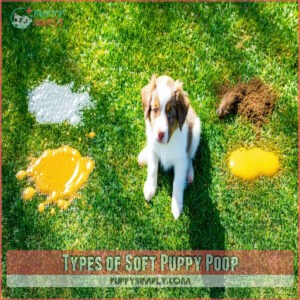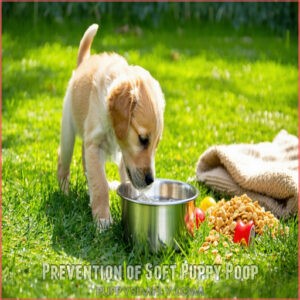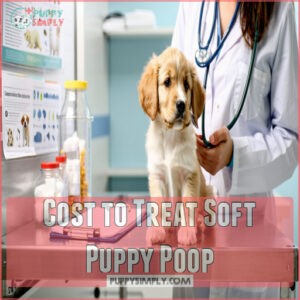This site is supported by our readers. We may earn a commission, at no cost to you, if you purchase through links.
 Worried about your puppy’s soft poop? Don’t panic! Soft stools can signal everything from dietary hiccups to gut microbiome imbalances.
Worried about your puppy’s soft poop? Don’t panic! Soft stools can signal everything from dietary hiccups to gut microbiome imbalances.
Your furry friend’s digestive system is sensitive, and changes in poop consistency are often normal. Watch for mucus, unusual colors, or persistent softness—these might indicate underlying issues.
Probiotics, a balanced diet, and reducing stress can help stabilize your pup’s tummy. While occasional soft puppy poop isn’t cause for alarm, persistent changes warrant a vet visit.
Keep an eye on hydration, monitor stool consistency, and remember: a healthy gut means a happy, bouncy pup. Curious about what’s really going on in that little belly?
Table Of Contents
- Key Takeaways
- Soft Puppy Poop: What is It?
- Causes of Soft Puppy Poop
- Types of Soft Puppy Poop
- Treatment for Soft Puppy Poop
- Prevention of Soft Puppy Poop
- When to See a Veterinarian
- Cost to Treat Soft Puppy Poop
- Frequently Asked Questions (FAQs)
- What Does It Mean if My Puppy’s Poop is Black?
- What Does It Mean if My Puppy’s Poop is Red?
- What Does It Mean if My Puppy’s Poop is White?
- What Does It Mean if My Puppy’s Poop is Yellow?
- What Does It Mean if My Puppy’s Poop is Green?
- Why is my puppy’s poop so soft?
- How can I harden my puppy’s stool?
- Is it normal for puppies to have sloppy poo?
- At what age should puppy poop be solid?
- What is soft dog poop?
- Conclusion
Key Takeaways
I’ll extract the 4 key takeaways about soft puppy poop based on the content:
- You’ll want to track your puppy’s poop consistency carefully, as soft stools can signal various issues like diet changes, stress, or microbiome imbalances that might require immediate attention.
- If your puppy’s soft stools persist beyond 48 hours or are accompanied by other symptoms like blood, mucus, or unusual colors, you’ll need to consult your veterinarian to rule out serious health concerns.
- You can help manage soft puppy poop through strategic interventions like adding probiotics, introducing fiber supplements, maintaining a balanced diet, and creating a stress-free environment for your pup.
- You’ll need to be proactive in monitoring your puppy’s gut health, understanding that occasional soft stools aren’t always alarming, but consistent changes could indicate underlying digestive system problems that need professional evaluation.
Soft Puppy Poop: What is It?
Puppy diaper disasters strike fear in every pet parent’s heart.
Soft puppy poop isn’t just a messy inconvenience—it’s your furry friend’s digestive system sounding an alarm.
These loose stools, ranging from mustard yellow to chocolate brown, can signal everything from dietary hiccups to potential health concerns.
Your pup typically poops 5-30 minutes after eating, which helps track their gut health’s early warning signs.
Mucus-lined or oddly colored stools scream for attention, transforming a routine potty break into a critical moment of puppy digestion detective work.
When firm becomes mushy, it’s time to lean into your parental instincts and consider a vet check-up.
These moments require careful observation, as they can indicate issues with your pup’s digestive system, making digestive system awareness crucial for pet parents.
Causes of Soft Puppy Poop
If your puppy’s poop looks more like soft-serve than a solid log, you’re not alone in this messy situation.
Understanding the underlying causes of soft puppy poop can help you quickly identify and address your furry friend’s tummy troubles.
Ensuring they stay happy, healthy, and comfortable is crucial, and addressing tummy troubles promptly is key to their well-being.
– Unbalanced Microbiome
Ever wondered why your furry friend’s stools look more like pudding than logs?
An unbalanced microbiome could be sabotaging your pup’s gut health.
Those microscopic bacterial buddies in your dog’s digestive system can go haywire, throwing everything off-kilter.
Microbiome imbalances disrupt normal digestion, leading to soft, unpredictable poops.
Research on Fading Puppy Syndrome highlights the importance of a balanced gut microbiome in puppies.
Probiotics might be your secret weapon in restoring balance and getting your puppy’s gut back on track.
– Stress
Your furry friend’s nervous system can wreak havoc on their digestive health, transforming calm moments into bathroom emergencies.
Stress silently sabotages your puppy’s gut, turning routine days into unpredictable episodes of soft stools.
Monitoring dog diet changes is essential to prevent digestive disruptions.
- Puppy Anxiety triggers unexpected digestive disruptions
- Canine Fear manifests through intestinal turmoil
- Environmental Changes spark sudden soft stool episodes
– Diet
When your pup’s digestive system goes haywire, diet often plays the villain.
Soft stools can emerge from unexpected nutritional landmines that wreak havoc on sensitive puppy guts.
Consider exploring puppy food supplements to support their nutritional needs.
- High-fat foods overwhelm immature digestive systems
- Abrupt diet changes spark intestinal rebellion
- Hidden ingredients trigger mysterious poop problems
Your puppy’s meal plan matters more than you might think.
Nutrient balance isn’t just about filling the bowl—it’s about supporting healthy digestion.
Probiotics and pumpkin can be game-changers, helping stabilize those unpredictable puppy soft stools and restore digestive harmony.
Types of Soft Puppy Poop
Five distinct types of soft puppy stools can signal your dog’s internal health mysteries.
Understanding these variations helps decode your pet’s digestive well-being, particularly in relation to soft puppy stools.
| Stool Type | Color | Potential Cause |
|---|---|---|
| Liquid Poop | Clear | Severe Intestinal Irritation |
| Mucoid Poop | Mucus-Covered | Gut Inflammation |
| Yellow Diarrhea | Yellow | Dietary Issues |
| Tarry Stools | Dark/Black | Possible Bleeding |
Soft puppy stools aren’t just messy—they’re your furry friend’s cryptic health report, often indicating internal health mysteries.
While occasional soft stool isn’t alarming, persistent changes demand your veterinarian’s attention, as they can signal severe intestinal irritation or other serious issues like gut inflammation.
Treatment for Soft Puppy Poop
When your puppy’s poop turns soft, it’s time to take action.
Here’s how to tackle those troublesome stools:
-
Gut Health Rescue:
- Add puppy probiotics to restore digestive balance
- Introduce fiber supplements like organic canned pumpkin
- Implement a bland diet of boiled chicken and rice
- Keep your pup hydrated with fresh water
- Monitor stool consistency closely
- Watch for additional symptoms
Your first line of defense involves strategic dietary changes and careful observation.
Soft stools can signal anything from stress to dietary issues.
For a thorough guide, explore this informative resource on treating puppy diarrhea.
While most cases improve with home care, persistent soft puppy poop demands professional vet advice.
Don’t wait if symptoms drag on – a quick check can prevent more serious gut health problems and get your furry friend back to normal faster.
Prevention of Soft Puppy Poop
Battling soft stool requires a strategic approach to your puppy’s gut health.
Your four-legged friend’s poop tells a story, and you’re about to become the ultimate digestive detective.
- Nail puppy nutrition by selecting high-quality food with targeted probiotic strains
- Introduce fiber supplements that stabilize gut microbiome balance
- Create a stress-free environment through consistent routines and gentle care
Controlling portion sizes prevents overfeeding, while fresh water keeps your pup hydrated.
Regular exercise stimulates healthy digestion and promotes superior poop quality.
Think of your puppy’s diet like a finely tuned orchestra – every ingredient plays a significant role in maintaining harmony.
Ensuring proper puppy probiotic levels is essential for a healthy gut.
By prioritizing gut health, you’ll transform soft stool from a recurring nightmare into a distant memory.
When to See a Veterinarian
Let’s zero in on your pup’s health warning signs.
When soft stools threaten to derail your furry friend’s well-being, it’s time to sound the alarm.
Watch out for these critical red flags:
- Bloody stool: A serious sign of potential internal damage
- Severe dehydration: Sunken eyes, dry gums spell trouble
- Persistent high fever: Beyond normal body temperature
- Intense abdominal pain: Whimpering or aggressive response to touch
Cost to Treat Soft Puppy Poop
When soft puppy poop hits your wallet, it’s important to understand the potential financial impact.
Treatment costs can range from $50 to $500, depending on the underlying cause.
Understanding puppy poop treatment is essential for managing expenses effectively.
| Expense Type | Estimated Cost |
|---|---|
| Diagnostic Testing | $25 – $45 |
| Medication | Varies |
| Veterinary Consultation | $50 – $200 |
| Emergency Care | $200 – $500 |
Pet insurance, savings accounts, and payment plans can provide financial relief for unexpected puppy health challenges.
Proactive care and early intervention can help manage soft puppy poop treatment expenses.
Frequently Asked Questions (FAQs)
What Does It Mean if My Puppy’s Poop is Black?
When alarm bells ring in your digestive tract, black poop could signal serious trouble.
It’s often a red flag for internal bleeding, ulcers, or parasites that’ll need your vet’s immediate attention.
What Does It Mean if My Puppy’s Poop is Red?
Red puppy poop could signal serious health issues like internal bleeding, intestinal parasites, or rectal injuries.
Don’t wait – contact your vet immediately for a proper diagnosis and treatment to safeguard your puppy’s health.
What Does It Mean if My Puppy’s Poop is White?
White puppy poop? Buckle up for a crappy adventure! Seriously, it’s a red flag. Your pup’s ghostly droppings could signal liver issues, dietary problems, or parasites. Vet visit ASAP, detective.
What Does It Mean if My Puppy’s Poop is Yellow?
Yellow puppy poop might indicate a digestive issue, dietary change, or potential infection.
If it’s persistent, doesn’t improve, or is accompanied by other symptoms, you’ll want to consult your veterinarian for a proper diagnosis.
What Does It Mean if My Puppy’s Poop is Green?
Like a mood ring for your pup’s gut health, green puppy poop signals something’s off.
It could mean dietary changes, stress, or potential infections.
When in doubt, consult your vet to make certain your furry friend stays happy and healthy.
Why is my puppy’s poop so soft?
Your puppy’s soft poop could stem from diet changes, stress, or health issues.
Don’t panic! Check their food, watch for other symptoms, and consult your vet if it persists or comes with vomiting, lethargy, or discomfort.
How can I harden my puppy’s stool?
If your dog’s diet lacks fiber, try mixing in pumpkin or switching to a high-quality, easily digestible food.
Gradually adjust meals and consult a vet if loose stools persist beyond 48 hours.
Is it normal for puppies to have sloppy poo?
Sloppy stools can be normal for young pups due to diet changes, stress, or minor digestive adjustments.
However, persistent loose poop lasting over 48 hours warrants a vet check to rule out serious health concerns.
At what age should puppy poop be solid?
By three months, most pups should have firmer, more consistent stools.
If your furry friend’s dropping soft, lumpy landmines past this age, it’s time to chat with your vet about diet, health, and potential underlying issues.
What is soft dog poop?
You’ll notice soft poop when your furry friend’s waste lacks normal firmness, appearing mushy or loose.
It’s often caused by diet changes, stress, or potential health issues that require careful monitoring and possible vet consultation.
Conclusion
In the case of soft puppy poop, knowledge is your best weapon in the battle for your pup’s digestive health.
Like a detective solving a mystery, you’ll decode the clues behind your dog’s tummy troubles.
Remember, soft puppy poop isn’t a dead end—it’s a roadmap to understanding your furry friend’s health.
Stay vigilant, trust your instincts, and don’t hesitate to consult your vet.
With the right care, you’ll help your pup bounce back to solid, happy poops in no time.














